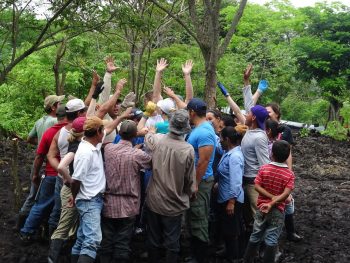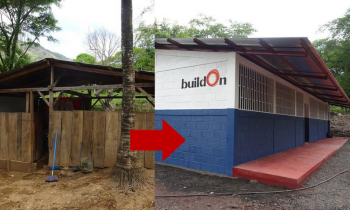By Sule Sahin
“Tuani!” (Nicaraguan slang for “cool”) was the best way to describe my experience in Nicaragua. This past May, the Northeastern University buildOn Chapter was able to send three of their students there to break ground on a school. I was lucky to be one of the three. It involved a lot of work throughout the school year and as a club we raised over $8,700 thanks to our many supporters and our club president, Mady Hahn-Smith. On the morning of May 25th, me, Annie Pinkham and Kevin Guevara departed on the journey of a lifetime into the small village of File Grande in the Matiguas region of Nicaragua.

The week consisted of hours of digging to build the foundation of the school, numerous meals of rice and beans, introductions to latrines (glorified porta-a-potties) but most importantly human connections. In addition to long lasting friendships we built amongst our group of trekkers, we were able to share the tight connection present amongst all the families in the village. What stood out to me during the trip was the love and support the community members offered each other. Despite their hardships in life, they were excited and optimistic about this new school. This was apparent the time I went with my fellow trek roommate and host family, a young couple with a one year old baby, Milagros, to church. Despite what religion we were, they were so welcoming and friendly. It was a morning of singing and learning open-mindedly about their beliefs.
The File Grande villagers were all reserved and nervous when we arrived but their shyness did not hinder from their generosity. Me and my roommate’s host mom would always prepare our dinner before their own and in the middle of the night, if I had to use the latrine, she would get out of bed herself to walk me there and back so I felt safe. They all had a simple yet hard working life which prioritized family and community above all, something rare to find these days in my own community. In fact, in a cultural activity where the women from the trek could talk privately to the women in the community, the community admitted if they were given the chance, most of them were not even interested in coming to the U.S.

This mentality really made me appreciate the mission of buildOn. Unlike other non-profits, they were not forcing on the community what the western world may believe the village needed to eliminate poverty. They were simply giving the education tools needed for them to break the cycle of poverty on their own. Before we had arrived there, the community had all agreed that they wanted a new primary school. Then during the opening ceremony, all of us trekkers along with the whole community signed a covenant expressing their need and desire for a school, and constructing a formal agreement that the community would remain committed to building and maintaining the school. Furthermore, it outlined that an equal number of boys and girls would attend the finished school. The whole village participated and even if they could not write their name, they agreed on the covenant with a thumbprint.
This proved to me that buildOn was unlike other nonprofits. They were not just giving what they had in abundance to those who they think needed it but honoring their community and providing them with resources to make a self-sustaining change themselves. As I am readjusting to my American life, I will never forget the excitement that the promise of a new school brought the entire village.


